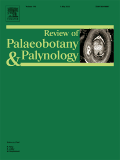
REVIEW OF PALAEOBOTANY AND PALYNOLOGY
metrics 2024
Uncovering Earth's Green Past
Introduction
REVIEW OF PALAEOBOTANY AND PALYNOLOGY, published by Elsevier, stands at the forefront of research in the fields of paleobotany and palynology. Since its inception in 1967, this esteemed journal has provided a vital platform for disseminating cutting-edge findings and comprehensive reviews that explore the intricate relationships between plant evolution, fossil records, and environmental changes. With its impressive categorization, being ranked Q1 in Paleontology and Q2 in Ecology, Evolution, Behavior and Systematics, it is recognized as a leading outlet for scholars, boasting a notable impact factor that underscores its influence within the academic community. Based in the Netherlands, the journal features a diverse range of open access options, although subscription models are also available, making it accessible to a broad audience of researchers, professionals, and students eager to delve into the complex histories of plant life. The REVIEW OF PALAEOBOTANY AND PALYNOLOGY not only champions original research but is also committed to enhancing interdisciplinary dialogue, thereby playing a crucial role in advancing our understanding of Earth's biological heritage from an evolutionary perspective.
Metrics 2024
 0.69
0.69 1.70
1.70 1.70
1.70 90
90Metrics History
Rank 2024
Scopus
IF (Web Of Science)
JCI (Web Of Science)
Quartile History
Similar Journals

Palaeoworld
Uncovering the Secrets of Life Through TimePalaeoworld is a leading peer-reviewed journal published by ELSEVIER, focusing on the dynamic and interdisciplinary fields of paleontology, ecology, and stratigraphy. Established in 2006, the journal aims to facilitate the dissemination of innovative research and significant discoveries that enhance our understanding of past life on Earth. With an impressive impact factor and categorized in the second quartile (Q2) for Ecology, Evolution, Behavior and Systematics, Paleontology, and Stratigraphy in 2023, Palaeoworld stands out in its commitment to high-quality scholarship. The journal is indexed in Scopus, ranking #23 in Paleontology and #14 in Stratigraphy, placing it within the top 20% of publications in these categories. As a valuable resource for researchers, professionals, and students alike, it provides unrestricted access to cutting-edge findings, detailed methodologies, and critical assessments of paleo-environmental data. This journal is not only a repository of knowledge but also a platform for advancing discussions that bridge past ecological patterns with contemporary issues.

Acta Botanica Mexicana
Connecting global researchers to ecological challenges.Acta Botanica Mexicana is a premier journal published by Instituto de Ecología AC, dedicated to advancing research in the fields of ecology, plant science, and biological sciences. With an E-ISSN of 2448-7589, this open-access journal facilitates extensive dissemination of scientific findings, ensuring that knowledge is accessible to researchers, professionals, and students worldwide. Established in 2008, Acta Botanica Mexicana has earned a notable reputation, achieving a Q3 ranking in plant science and a Q4 ranking in ecology and evolution for 2023. This positioning underscores its commitment to publishing high-quality research that addresses vital issues in ecological and botanical studies. With a focus on innovative methodologies and pragmatic solutions, the journal invites contributors to share their insights and findings, thus enriching the academic landscape and fostering collaborations that drive the field forward. The journal is based in Michoacán, Mexico, and serves as a key hub for researchers engaging with the challenges and intricacies of plant and ecological studies.

NOVITATES CARIBAEA
Celebrating the Diversity of Caribbean Life and LandscapesNOVITATES CARIBAEA is a distinguished academic journal dedicated to the exploration of Caribbean natural history, fostering a deep understanding of the region's biodiversity and ecological significance. Published by the MUSEO NACIONAL HISTORIA NATURAL-SANTO DOMINGO, this open-access journal has been a platform for scholarly communication since 2009, aiming to provide unrestricted access to high-quality research outputs. With its commitment to promoting research in Caribbean ecosystems, NOVITATES CARIBAEA plays a crucial role in the academic community, facilitating knowledge exchange among researchers, professionals, and students. The journal welcomes submissions exploring various aspects of natural history, including taxonomy, conservation biology, and ecological studies, making it an essential resource for those dedicated to understanding and preserving the unique environments of the Caribbean.

Palaeontographica Abteilung B-Palaeophytologie Palaeobotany-Palaeophytology
Revealing the Stories of Earth's Ancient FloraPalaeontographica Abteilung B-Palaeophytologie Palaeobotany-Palaeophytology is a distinguished journal published by E SCHWEIZERBARTSCHE VERLAGSBUCHHANDLUNG in Germany, focusing on the intricate study of paleobotany, including the evolution and diversity of plant life throughout geological time. With an impressive Scopus ranking of #25 out of 113 in the field of paleontology, the journal is recognized for its contribution to advancing our understanding of ancient ecosystems, earning a prestigious Q2 quartile ranking in 2023. Despite its lack of open access options, the journal provides invaluable insights for researchers, professionals, and students alike who are passionate about exploring the fossil record and its implications for plant evolutionary history. The journal's collaborative nature and periodic publication schedule, ranging from 2005 to 2024, ensure that it remains at the forefront of paleontological research.
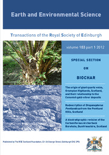
Earth and Environmental Science Transactions of the Royal Society of Edinburgh
Unveiling the complexities of our planet's systems.Earth and Environmental Science Transactions of the Royal Society of Edinburgh is a prestigious journal published by Cambridge University Press, dedicated to advancing research in the field of Earth and planetary sciences, as well as environmental science. With its ISSN 1755-6910 and E-ISSN 1755-6929, the journal has established itself as a crucial platform for disseminating innovative research and comprehensive reviews since its inception in 2007. Positioned in the Q3 quartile for both Earth and Planetary Sciences and Environmental Science, it contributes significantly to the ongoing dialogue and development in these areas, boasting a Scopus ranking that reflects its commitment to scholarly excellence with an emphasis on interdisciplinary approaches and real-world applications. The journal is based in the United Kingdom, with its editorial office located at the Edinburgh Building, Shaftesbury Road, Cambridge. As an essential resource for researchers, professionals, and students alike, Earth and Environmental Science Transactions offers opportunities for open discourse on pressing environmental challenges, fortifying its role in fostering a deeper understanding of our planet's systems and their interconnectedness.
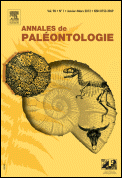
ANNALES DE PALEONTOLOGIE
Pioneering Studies in Earth and Planetary SciencesANNALES DE PALEONTOLOGIE is a distinguished academic journal published by MASSON EDITEUR that plays a pivotal role in the field of paleontology. With an ISSN of 0753-3969 and an E-ISSN of 1778-3666, this journal has been a vital resource since its inception in 1988, continuously contributing to the advancement of knowledge in Earth and Planetary Sciences, particularly focusing on paleontological research. Currently ranked #68 out of 113 in its category by Scopus, and celebrated for its Q2 quartile standing, ANNALES DE PALEONTOLOGIE publishes innovative studies, reviews, and discussions that appeal to a diverse audience of researchers, professionals, and students. The journal aims to foster a deeper understanding of paleontological phenomena and encourages interdisciplinary collaboration within the scientific community. Although it is not an open access journal, its commitment to scholarly excellence ensures that the content is highly regarded and widely referenced in academic circles. Situated in Issy-les-Moulineaux, France, it continues to maintain a global readership while promoting significant advancements in paleontological research.
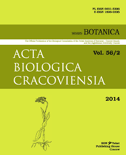
ACTA BIOLOGICA CRACOVIENSIA SERIES BOTANICA
Connecting researchers to the heart of plant science.ACTA BIOLOGICA CRACOVIENSIA SERIES BOTANICA is a distinguished journal published by the Polska Akademia Nauk (Polish Academy of Sciences), with its roots tracing back to 1996. As a pivotal publication in the field of Plant Science, it serves to disseminate high-quality research and findings, contributing to the ongoing development and understanding of biodiversity, plant ecology, and conservation. The journal is indexed under Scopus, ranked #203 out of 516 in its category, placing it in the 60th percentile and firmly within Q3 quartile for Plant Science in 2023. Researchers, professionals, and students will find invaluable content within its pages, enhancing their knowledge and supporting academic exploration. Although it currently does not offer open access options, the journal remains a crucial resource for those engaged in botanical sciences, with a commitment to advancing scholarship in Poland and beyond.
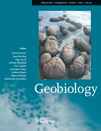
Geobiology
Pioneering Research at the Crossroads of Ecology and Earth SciencesGeobiology, published by WILEY, is a prestigious journal at the forefront of interdisciplinary research in Earth and Planetary Sciences, Ecology, and Environmental Science. With an ISSN of 1472-4677 and an E-ISSN of 1472-4669, this journal has achieved remarkable recognition as evidenced by its Q1 categorization in multiple relevant fields, including Earth and Planetary Sciences, Ecology, and Environmental Science, according to the 2023 quartile rankings. Covering a diverse range of topics from biogeochemical cycles to the impacts of climate change on biodiversity, Geobiology serves as a vital platform for researchers, professionals, and students alike. The journal boasts impressive Scopus rankings, placing it within the top tiers of its fields, which is indicative of its significant influence and contribution to advancing knowledge. Although it does not operate under an Open Access model, Geobiology ensures widespread reach and accessibility, allowing for impactful dialogues within the scientific community. Researchers are encouraged to submit their findings and engage with cutting-edge studies to advance our understanding of the interplay between biological and geological processes.

AMERICAN FERN JOURNAL
Exploring the Rich Diversity of Ferns and LycophytesAMERICAN FERN JOURNAL, published by AMER FERN SOC INC, is a pivotal resource for researchers and enthusiasts in the fields of Ecology, Evolution, Behavior, and Plant Science. With a publication history dating back to 1993 and extending through 2024, this journal serves as a critical platform for the dissemination of knowledge related to ferns and lycophytes, contributing significantly to taxonomic and ecological studies. While it currently holds a Q4 rank in Ecology, Evolution, Behavior and Systematics and a Q3 rank in Plant Science, the journal continually strives to improve its relevance and impact within the scientific community. Researchers can access its valuable content through conventional subscription models, providing curated articles that advance the understanding of fern biodiversity and conservation. This journal is essential for anyone devoted to the exploration and preservation of these vital plant groups, offering insights that are not only relevant to academic circles but also inspire the broader public to appreciate the beauty and importance of ferns in our ecosystems.
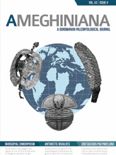
AMEGHINIANA
Elevating Understanding of Ecological Interactions and EvolutionAMEGHINIANA is a distinguished academic journal published by the ASOCIACION PALEONTOLOGICA ARGENTINA, serving as a vital platform for the dissemination of cutting-edge research in the fields of Ecology, Evolution, Behavior and Systematics, as well as Paleontology. With its ISSN 0002-7014 and E-ISSN 1851-8044, the journal has established itself as a key reference point for scholars seeking to explore the intricate relationships within ecological systems and the evolutionary history of species. Despite not offering open access, AMEGHINIANA maintains a reputation bolstered by a Q3 ranking in both its subject categories, underlining its sustained commitment to enhancing scientific knowledge. Researchers and professionals alike benefit from this journal’s extensive archive of studies dating back to 1985, with ongoing contributions expected until 2024. With a focus on high-quality content, this journal is essential for anyone immersed in the study of paleobiology and ecological systems.